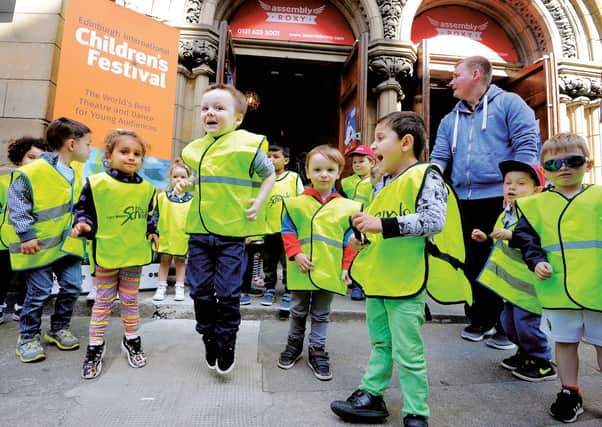Anatomy of a festival cancellation - Joyce McMillan


Early December 2019, and I am part of an audience crammed into a packed, barn-like outhouse at a church-turned-refugee centre in suburban Belgium, watching a fascinating show called Inuk by Ghent-based company Orka Studio. Set in an old, closed-down hotel, the show is about what you do – if you are middle-aged and solitary and set in your ways – when strangers come to your door begging for shelter; and I am here because the 2020 Edinburgh International Children’s Festival is set to stage a major Focus On Flanders season, highlighting four shows from a region that boasts some of the finest and most imaginative theatre for children and young people anywhere in Europe.
It never occurred to me, as this brilliant show ended, that I wouldn’t be seeing it again in Edinburgh, in the last week of May 2020. For 30 years now – since it was founded in Inverleith Park back in 1990 – the EICF, under various names, has been a May fixture on Edinburgh’s festival calendar, gradually emerging as one of the world’s foremost children’s theatre events; and for EICF 2020, festival director Noel Jordan had put together an impressive programme, featuring not only the Flanders season and four new Scottish shows, but work by companies from Norway, the Netherlands, Canada and France, Australia, Spain and Ireland. The festival was also set to host its usual extensive delegate programme of conferences, workshops and taster sessions; and as ever, it would have brought shows to venues across the city, from the Traverse Theatre to the Lyra in Craigmillar, where Inuk was set to appear.
Advertisement
Hide AdLast week, though – for EICF as for so many others – all of these well-laid plans came crashing down, as Imaginate, Scotland’s year-round children’s theatre organisation which runs the festival, realised that the mounting coronavirus crisis made cancellation inevitable; and the small Imaginate staff began to tread a path that will become familiar to arts organisations across the world in the coming months.
“It was on Monday 16th, really, that we realised we would probably have to cancel,” says the organisation’s chief executive and year-round leader, Paul Fitzpatrick; “and the first thing I had to do was to talk to all of our team – eight staff, and then the five freelance people who come on board in the run-up to the Festival. Then I had to talk to our board, and particularly to our chair and vice-chair, who are great. We also had to talk to our two principal public funders, Creative Scotland and Edinburgh City Council; it was particularly useful to have Creative Scotland’s early assurance that they would honour all existing funding agreements, whether or not events had to be cancelled because of coronavirus. And by lunchtime on Tuesday, we had agreement that we had to cancel; it was a strange feeling, but we were sure it was the right thing to do.”
The public announcement of the decision was delayed until Thursday, though; and over those 48 hours, the Imaginate team set about contacting every single company or individual artist, contractor, venue, or other stakeholder involved in a complex 12-day festival featuring 15 shows, as many workshop sessions, and dozens of performers, across seven Edinburgh venues. “We wanted not only to contact them so that they would be pre-warned about the cancellation,” says Fitzpatrick, “but also to be able to tell them what we would be able to offer them financially. So in those 48 hours we did all the sums, and tested out three different scenarios; and I’m happy to say that largely thanks to Creative Scotland, we will be able to pay all the Scottish artists and companies involved in full.
“That’s a huge relief to me; because we are quite a small organisation, and all the work we do in Scotland – work which has built up a really strong international reputation – absolutely depends on this fragile ecology of independent artists and small companies who actually create the shows. My worst fear about this huge shutdown of schools, and theatre in general, is that that community of artists who really want to do children’s theatre work just won’t be there when we come out the other side. So I’m glad we were able to do something to protect this year’s EICF artists from that.”
And for the future, Fitzpatrick and his team are already facing resolutely towards 2021, and a future beyond the current crisis. “I think we have to think that way,” says Fitzpatrick, “in order to keep our focus. We will be having an online meeting later this week to rake through what we were planning for this year, and see what can be salvaged – perhaps our big opening Family Day at the National Museum of Scotland could happen as a stand-alone event this autumn. Then for 2021 – well, I think our instinct now will be to try to restage as much of this year’s Festival as we can. It was a great programme; and we really want our audiences to see this work, including the work from Flanders. “After we made our public announcement on Thursday, we couldn’t help being struck by the wonderful supportive message we were getting – from schools we’ve worked with, from companies all over the world, from the other Edinburgh festivals, from individual artists who seemed more worried about us than about themselves. That’s the community we’ll be trying to keep together through all this. And there’s part of me that wonders whether this isn’t also an opportunity; just to stand back a bit from the relentless, busy cycle of producing a festival on time every year, to pause and reflect on what we’re doing. So I hope we’ll be doing a bit of that, too, in the months to come.”
The next Edinburgh International Children’s Festival will take place from 19-30 May 2021, in venues across Edinburgh